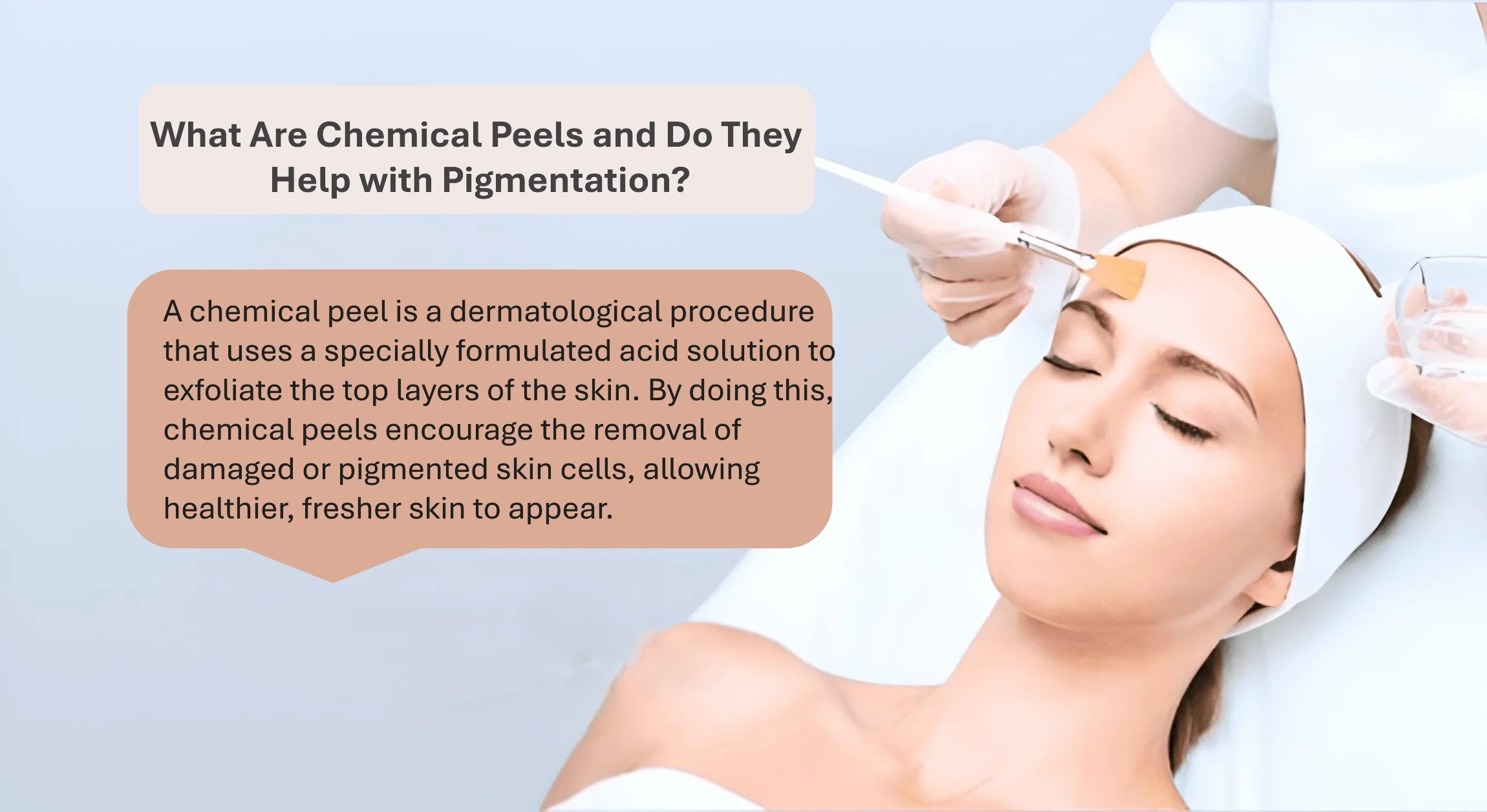What Are Chemical Peels and Do They Help with Pigmentation? Understanding How They Brighten and Even Out Skin Tone
What Are Chemical Peels and Do They Help with Pigmentation? Understanding How They Brighten and Even Out Skin Tone
Pigmentation issues like melasma, sunspots, and post-inflammatory hyperpigmentation (PIH) can leave the skin looking uneven and affect confidence. While skincare products help over time, many people consider in-office treatments like chemical peels for faster, more visible results. But what exactly are chemical peels, and do they really help with pigmentation? Let’s explore how they work, their benefits, and what you should know before considering one.
What Are Chemical Peels?
A chemical peel is a dermatological procedure that uses a specially formulated acid solution to exfoliate the top layers of the skin. By doing this, chemical peels encourage the removal of damaged or pigmented skin cells, allowing healthier, fresher skin to appear.
Peels come in various strengths and types, typically classified into three categories:
-
Superficial peels: Target only the outermost layer of skin (epidermis). Commonly use mild acids like glycolic acid, lactic acid, or salicylic acid. Ideal for mild pigmentation and dullness with minimal downtime.
-
Medium-depth peels: Penetrate deeper into the epidermis and upper dermis. Often use trichloroacetic acid (TCA) at moderate concentrations. Can address more stubborn pigmentation and textural changes.
-
Deep peels: Reach deeper layers of the dermis, usually performed with higher concentrations of TCA or phenol. Best for severe sun damage and deep pigmentation, but they come with significant downtime and higher risk of complications.
How Do Chemical Peels Help with Pigmentation?
Chemical peels work on pigmentation by speeding up the natural process of cell turnover. Here’s how they help:
-
Exfoliating pigmented cells: By removing the outer layers of skin where excess melanin is concentrated, peels help fade dark spots over time.
-
Regulating melanin production: Some peels (like those containing glycolic acid or lactic acid) also help inhibit tyrosinase, an enzyme essential in melanin synthesis, slowing down new pigment formation.
-
Boosting overall radiance: Removing dead skin cells and damaged layers reveals smoother, brighter, and more even-toned skin beneath.
Who Can Benefit?
Chemical peels can be effective for many types of pigmentation, including:
-
Sun-induced spots and freckles
-
Post-inflammatory hyperpigmentation from acne
-
Melasma (though melasma often requires a combination approach)
Important Considerations
While chemical peels can significantly improve pigmentation, they aren’t a magic fix, and results often depend on several factors:
-
Consistency: A single peel might bring mild improvement, but a series of peels spaced weeks apart usually delivers better, longer-lasting results.
-
Skin type: Darker skin tones can be more prone to post-inflammatory hyperpigmentation if the peel is too strong. This makes professional evaluation essential.
-
Sun protection: After a peel, the skin becomes more sensitive to sunlight. Daily use of a broad-spectrum sunscreen is crucial to prevent new pigmentation and protect healing skin.
-
Professional supervision: Chemical peels should be performed or supervised by qualified dermatologists or licensed skincare professionals to minimize risks.
Bottom Line
Chemical peels are a scientifically supported, effective treatment for many pigmentation concerns. By encouraging gentle removal of pigmented skin cells and promoting fresh cell turnover, they help reveal clearer, more even-toned skin. Combined with daily sun protection and proper skincare, chemical peels can play a powerful role in brightening your complexion and boosting your skin confidence.

Related Blog
What Causes Oily Skin and Can It Be Managed Naturally? Exploring Root Causes and Gentle Solutions
Aug 2, 2025 by Admin
General
What Are the Signs That You Have Sensitive Skin? Key Symptoms to Help You Identify This Delicate Skin Type
Aug 1, 2025 by Admin
General